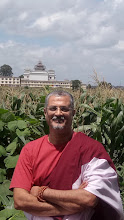Loving-kindness, the root of practice
This is the root of all the Dharma practices: generating the Bodhicitta [loving-kindness]. If one can really generate genuine Bodhicitta within one's mind, then it is very easy to move nearer to ultimate liberation. Bodhicitta is known as the awakening mind. The awakening mind is without partiality and equally benefits all sentient beings. If we have the thought of doing something good and beneficial only for our families and friends and then we want to create all kinds of obstacles for someone we don't like or whom we consider to be an enemy, this is not Bodhicitta.
Generating Bodhicitta, the awakening mind, is for the purpose of benefiting all sentient beings without any exception. Even living creatures such as ants, in their ultimate nature, they also have the Buddha nature. Even cockroaches. There is no difference in the size of the form. In the teachings it says that there is no limit to space, that space is immeasurable, and similarly there is no limit of sentient beings. Their number is immeasurable. Hence we have to generate the kind of Bodhicitta that is immeasurable for all these immeasurable numbers of beings.
If Bodhicitta, the awakening mind, is within your mindstream from birth, then of course it is very good! But if one cannot generate in that way or have that kind of quality, at least one can understand the necessity and importance of Bodhicitta. Based on that one can receive the Bodhisattva vows from a master and also from the body, speech and mind supports - like shrines and altars. As we receive the Bodhisattva vows, we can apply all this into practice, and the fact that we have been born as human beings becomes something really meaningful.
Within our mind-streams, there are all kinds of mental afflictions or defilements that are called the five poisons (pride, ignorance, greed, envy and anger). These are the main causes by which we experience all the kinds of sufferings and problems in Samsara. That is why our most important responsibility as a practitioner is how we can get rid of this afflicted mind, how we can abandon it and how we can suppress these poisons.
It is difficult in the beginning to really generate Bodhicitta, the positive thought of benefiting all other sentient beings, within one's mind. But if we constantly think of it and try to contemplate and to train ourselves to get through all these practices, then it will become easy, like a habit. All the Buddhas and Bodhisattvas of the past, in countless numbers like the stars of the sky, all these Enlightened Beings were in the beginning the same as us - just sentient beings. They were not born from the beginning as Buddhas.
So with this precious human birth, when we have all this intellectual understanding, we have to really contemplate and think about what is the best benefit that one can really achieve within this lifetime. We could just complete our worldly activities. But that is still just cultivating the same kinds of causes and conditions, and we will just rebound into Samsara again. We will not achieve the ultimate happiness. Even if we have really high rank or we have all kinds of luxuries and material belongings, or we have fame and very good friends and many subjects or attendants, still there is no real essence there from which we can benefit. So if we spend our whole lifetime just to get success still we will find there is nothing there that we can rely on. Everything is so impermanent and changeable.
You all have some intellectual understanding so you can think and examine for yourself and understand what is really going on. One should examine and think over what one has really done and what benefits one is really getting within one's lifetime. Even if one is very rich, very wealthy, very intellectual, very wise - if we look into ourselves, into our own minds, we can understand just how much experience of peace or happiness is really there.
(From a discourse given by HH Penor Rinpoche, Namdroling Monastery - Bylakuppe, who attained Parinirvana in March 2009. Translated by Khenchen Tsewang Gyatso Rinpoche. More on: www.palyul.org)
Girish Deshpande, is a Pune based Nyingma Buddhist and Dharma practitioner
Thursday, May 27, 2010
Subscribe to:
Post Comments (Atom)

No comments:
Post a Comment